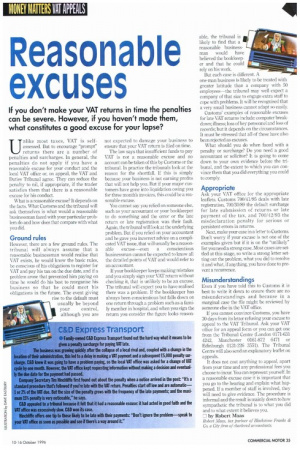Reasonable excuses
Page 37

If you've noticed an error in this article please click here to report it so we can fix it.
Unlike most taxes, VAT is selfassessed. But to encourage "prompt" returns there are a number of penalties and surcharges. In general, the penalties do not apply if you have a reasonable excuse for your conduct and the local ur office or, on appeal, the VAT and Duties Tribunal agree. They can reduce the penalty to nil, if appropriate, if the trader satisfies them that there is a reasonable excuse for his conduct.
What is a reasonable excuse? It depends on the facts. What Customs and the tribunal will ask themselves is what would a reasonable businessman faced with your particular problem do and how does that compare with what you did.
Ground rules
However. there are a few ground rules. The tribunal will always assume that a reasonable businessman would realise that VAT exists, he would know the basic rules, be conscious of his obligations to register for VAT and pay his tax on the due date, and if a problem arose that prevented him paying on time he would do his best to reorganise his business so that he could meet his obligations in the future. The event giving rise to the default must usually be beyond your control, although you are not expected to damage your business to ensure that your VAT return is filed on time.
The law says that insufficient funds to pay VAT is not a reasonable excuse and no account can be taken of this by Customs or the tribunal. In practice the tribunals look at the reason for the shortfall. If this is simply because your business is not earning profits that will not help you. But if your major customers have gone into liquidation owing you for three month's invoices, this could be a reasonable excuse.
You cannot say you relied on someone else, such as your accountant or your bookkeeper to do something and the error or the late return or late registration was their fault. Again, the tribunal will look at the underlying problem. But if you relied on your accountant and he gave you incorrect advice on a complicated VAT issue, that will usually be a reasonable excuse—even a conscientious businessman cannot be expected to know all the detailed points of VAT and would refer to an accountant.
If your bookkeeper keeps making mistakes and you simply sign your VAT return without checking it, that is unlikely to be an excuse. The tribunal will expect you to have realised there was a problem. If the bookkeeper has always been conscientious hut falls down on one return through a problem such as a family member in hospital, and when you sign the return you consider the figure looks reason
able, the tribunal is likely to find that a reasonable businessman would have believed the bookkeeper and that he could rely on his work.
But each case is different. A one-man business is likely to be treated with greater latitude than a company with 50 employees—the tribunal may well expect a company of that size to engage extra staff to cope with problems. It will be recognised that a very small business cannot adapt so easily.
Customs' examples of reasonable excuses for late VAT returns include: computer breakdown; illness; loss of key personnel and loss of records; but it depends on the circumstances. It must be stressed that all of these have also been rejected as excuses.
What should you do when faced with a penalty or surcharge? Do you need a good accountant or solicitor? It is going to come down to your own evidence before the tribunal, and the extent to which you can convince them that you did everything you could to comply.
Appropriate Ask your VAT office for the appropriate leaflets. Customs 700/41/95 deals with late registration, 700/30/89 the default surcharge for late submission of returns or late payment of the tax, and 700/12/93 the misdeclaration penalty for serious or persistent errors in returns.
Next, make your case in a letter to Customs. Don't worry if your excuse is not one of the examples given but if it is on the "unlikely" list you need a strong case. Most cases are settled at this stage, so write a strong letter setting out the problem, what you did to resolve it and what, if anything, you have done to prevent a recurrence.
Misunderstandings
Even if you have told this to Customs it is best to write it down to ensure there are no misunderstandings and because in a marginal case the file might be reviewed by someone else in the VAT office.
If you cannot convince Customs, you have 30 days from its letter refusing your excuse to appeal to the VAT Tribunal. Ask your VAT office for an appeal form or you can get one from the Tribunal Centre (London 0171.631 4242, Manchester 0161-872 6471 or Edinburgh 0131-226 3551). The Tribunal Centre will also send an explanatory leaflet on appeals.
It does not cost anything to appeal, apart from your time and any professional fees you choose to incur. You can represent yourself. In a reasonable excuse case it is important that you go to the hearing and explain what happened. If a member of staff is involved, they will need to give evidence. The procedure is informal and the result is mainly down to how sympathetic the tribunal is to what you did and to what extent it believes you.
by Robert Maas
Robert Maas, tax partner of Blackstone Franks & Co, a City firm of chartered accountants.
























































































































